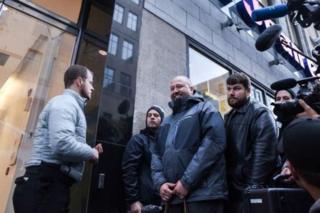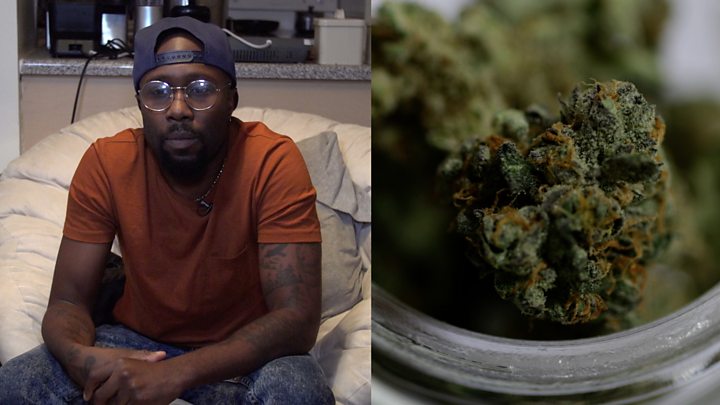 Image copyright
Image copyright
Getty Images
The queue outside a cannabis store in Canada
Across the country, Canadians queued for the chance to buy recreational cannabis legally for the first time.
The end of prohibition on Wednesday was marked by parties, park hangouts and non-stop media coverage.
But some worried that legalisation would increase use, especially amongst youth, and create new safety problems.
The shift in policy was a watershed moment for the country, which is now one of only two nations in the world where marijuana is legal.
The people and parties
The first person in Canada to buy marijuana legally was Ian Power, who was first in line in the easternmost province of Newfoundland and Labrador when the clock struck midnight.
“It’s been my dream to be the first person to buy the first legal gram of cannabis in Canada, and here I finally am,” he said.
Across the country, and hours later, Alex Smith was among the many leaving the BC Cannabis Store with a brown paper bag in hand.
The province-run retail store in Kamloops, located in an unassuming strip mall, is currently the only legal store in British Columbia.
Provincial officials boasted about its clean “west coast casual” interior and range of products.
Mr Smith called the experience of shopping there “a little surreal”.
“For my entire adult life I’ve been a closet pot smoker, trying to hide it because I do tend to run in circles that don’t consume cannabis that often,” he told the BBC.
“Now that it’s legal – and actually going into a storefront like this – I felt almost relieved but also justified in smoking pot. It’s OK now, in the government’s mind at least.”
Image copyright
Getty Images
Cannabis users celebrate legalisation at Trinity Bellwoods Park in downtown Toronto
Yet those expecting legalisation to turn the country into a scene out of a movie featuring ’70s and ’80s hippie comedy duo Cheech and Chong may be disappointed.
The province of Ontario passed a law allowing cannabis in public places where smoking was permitted only 17 hours after legalisation, meaning that the streets of Toronto were largely drug-free throughout the day.
Most of the partying took place on the premises of private businesses, like Hot Black Coffee in the downtown.
The coffee shop turned its back patio into a “chill” lounge where people could listen to music, drink coffee and yes, smoke-up. Co-hosting the party was Robin Ellins, who owns the paraphernalia shop next door, The Friendly Stranger.
Ellins, a long-time advocate for legalisation, says he is “elated” by today’s news.
“It’s kind of hard to think that it’s actually happened, there were times we thought this would never happen,” he said. “This is monumental.”
The policy
Legalisation is hardly a free-for-all for pot smokers – there are several aspects of cannabis consumption that are still illegal.
Users must be 18 to 19 to purchase, and there are strong penalties for those caught selling to minors.
Canadians will be limited to the number of plants they can grow themselves, and can only hold 30 grams (one ounce) on their person in public at a time.
The government also introduced new drug-impaired driving legislation that include stiff fines and possible jail time. Police will be able to demand suspected drivers take a roadside sobriety test or a provide a saliva sample to test for THC, the psychoactive compound in cannabis.
The reliability of these saliva tests has raised concerns, and legal experts expect challenges to the law to make their way to court.
A sign at a cannabis store in British Columbia warns to keep the product away from children
Health officials have voiced their own concerns.
The Canadian Medical Association Journal published an editorial calling legalisation “a national, uncontrolled experiment in which the profits of cannabis producers and tax revenues are squarely pitched against the health of Canadians”.
The Canadian Psychiatric Society on Wednesday cautioned Canadians under 25 about using cannabis, warning there is evidence “early and regular use” can affect things like memory attention and the ability to process thoughts and experience and could increase the risk of developing mental health issues like depression in people already vulnerable to them.
The Society of Obstetricians and Gynaecologists of Canada warned there was a growing body of evidence that cannabis use during pregnancy could have a negative impact on the developing foetus.
Image copyright
Getty Images
PM Justin Trudeau says he has “no intention” of smoking marijuana
The PM
Today’s news was heralded as a win for Canadian Prime Minister Justin Trudeau, who promised to make marijuana legal back in 2014 when he was running for office.
He has admitted to smoking cannabis five or six times in the past, even once as a sitting member of parliament.
But he says he never really enjoyed the experience.
Now known for his love of jogging and healthy eating, he told journalists in Ottawa on Wednesday that he does not even drink coffee and has “no intention of using marijuana”.
Trudeau has called criminal prohibition of cannabis in Canada, in place for nearly a century, a “failure”.
Canadians continued to use the drug, especially minors, and there was a robust black market.
The government has chosen to replace prohibition with a system of “strict regulatory control” they hope will be more effective at keeping cannabis out of the hands of minors and at reducing health and social harms related to its use.
On Wednesday, Canada also announced it would to waive wait time and fees for a those who have served their time for minor cannabis possession convictions and want to apply for a pardon.
“There is a disproportionate representation of young people from minorities who are saddled with criminal convictions,” Mr Trudeau said.

“This will make a real difference for people who have been unfairly impacted from the previous regime.”
Some advocates for amnesty say it is a good first step but are calling on Canada to have those convictions expunged, which would completely erase the record.
The pot jokes
Of course, no coverage of marijuana legalisation would be complete without several terrible marijuana puns and jokes.
Plenty of police departments used the day to poke fun at some standard stoner tropes in order to advocate for responsible consumption.
“If #cannabis is on your agenda for later, may we suggest buying some snacks BEFORE consumption so you don’t need to track down a Designated Driver for a munchie run at 2am!” suggested police from Newfoundland and Labrador.
The Royal Ontario Museum, which has a large collection of ancient artefacts, tweeted pictures of pottery throughout the day to commemorate the occasion,
And a media debate over what to call the day sparked a flurry of impassioned opinions, but no general consensus.
One reporter for Vice Media suggested Hash Wednesday, after the Catholic holy holiday. Others have called it “Green Day”, “Weed Wednesday”, and “1017”, the date it became legal.
But a suggestion by the New York Times that “C-Day” was the official moniker was nearly universally derided.
Cannabis in Canada: How it went down on Legalisation Day

